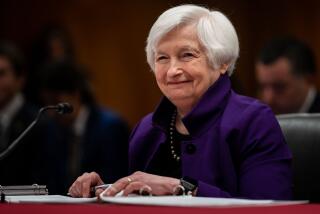Bank Deposit Insurance Fund May Need Bailout
- Share via
WASHINGTON — The bank deposit insurance fund may need a taxpayer bailout within three years, the Bush Administration said Wednesday, warning that a depressed real estate market has dramatically increased the potential losses from bank failures.
The fund faces a deficit of $39 billion by 1996, according to the budget issued Wednesday. As recently as July, the Administration’s worst-case estimate predicted losses of no more than $32 billion for the fund, which protects deposits up to $100,000.
The economic recovery is “slower than had been projected,” and the nation is plagued by a “continued decline in real estate markets,” according to an Administration budget analysis.
The analysis will be used to bolster President Bush’s renewed call for bank reform, which he claims is necessary to restore the health of the nation’s financial system. Congress rejected his proposal for reform last year.
Instead, Congress voted to allow the insurance fund to borrow $30 billion from the Treasury, with the money to be repaid by the banking industry. Federal regulators said the $30 billion should be adequate to handle bank failures, and they warned that the figure represented the limit of the industry’s ability to pay.
But the new, higher estimate of $39 billion issued on Wednesday suggests that a taxpayer bailout may be unavoidable.
“We hope we’re wrong, we hope (the fund deficit) figure is a lot lower,” an Administration official said Wednesday. “But if there is no comprehensive banking reform, we cannot offer assurances” that the fund can avoid a taxpayer bailout, he said.
The Administration wants Congress to give the banks authority to move across state lines without restrictions and to allow commercial firms to own banks. The interstate activity would enable big banking firms to save money by eliminating the separate corporations, accounting and regulatory systems they use in different states. With reduced expenses, banks would be healthier and less likely to fail, reducing the threat to the federal insurance fund, the Administration argues.
If the bank reforms are adopted by Congress, the insurance fund deficit would peak in 1995 at $28 billion, according to the budget document. This would fall within the $30 billion that the industry is capable of financing and would make a taxpayer contribution unnecessary, the Administration official said. However, skeptical Democrats in control of Congress aren’t likely to accept the Administration’s arguments and approve bank powers that they rejected less than a year ago.
Both chairmen of banking committees--Rep. Henry Gonzalez (D-Tex) in the House and Sen. Donald Riegle (D-Mich.) in the Senate--have said they do not expect major new banking legislation this year.
More to Read
Get the L.A. Times Politics newsletter
Deeply reported insights into legislation, politics and policy from Sacramento, Washington and beyond. In your inbox twice per week.
You may occasionally receive promotional content from the Los Angeles Times.










